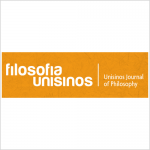The colored-brain thesis
Vol. 22. N.1 (2021): Jan-Apr • Filosofia Unisinos - Unisinos Journal of Philosophy
Autor: Osvaldo Pessoa Jr.
Resumo:
Discute-se em um viés histórico e defende-se a “tese do encéfalo colorido”, ou fisicismo qualitativo forte. Esta tese foi proposta por Thomas Case (1888), em um contexto não ma- terialista, e é próxima a visões exploradas por H. H. Price (1932) e E. Boring (1933). Usan- do o experimento mental do quarto de Mary, pode-se argumentar que fisicismo implica fisicismo qualitativo. O fisicismo qualitativo envolve três afirmações básicas: (i) internismo perceptivo e realidade dos qualia; (ii) fisicismo ôntico, caraterizado como uma descrição no espaço, no tempo e na escala; e (iii) identidade mente-encéfalo. Além disso, adicio- na-se (iv) o estruturalismo na física e, distinguindo a presente versão daquelas sugeridas por H. Feigl e S. Pepper, (v) o realismo da descrição física. Apresenta-se o “argumento do neurocirurgião”, de porque a verdidão de um abacate percebido visualmente, que estaria presente no encéfalo como um atributo fisicoquímico, não seria visto como verde por um neurocirurgião que abra o crânio do observador. Compara-se esta corrente com duas visões próximas, os monismos russellianos (e schlickianos) e o pamprotopsiquismo (incluindo o panqualitatismo). Segundo o fisicismo qualitativo forte aqui apresentado, a vivência fenomênica de um quale q é idêntica a uma qualidade fisicoquímica q, que surge de uma combinação da (1) materialidade ω associada ao encéfalo e (2) da organização ou estrutura causal ∑ dos elementos rele- vantes do encéfalo, incluindo nesta organização a estrutura do self: (∑ω)q. A “lacuna explicativa” entre estados mentais e físicos migra para uma lacuna entre qualidades físico-químicas q e a materialidade organizada de uma região específica do encéfalo (∑ω)q, e é vista como podendo ser coberta apenas por postulados não explicativos.
Abstract:
The “colored-brain thesis”, or strong qualitative physicalism, is discussed from historical and philosophical perspectives. This thesis was proposed by Thomas Case (1888), in a non-materi- alistic context, and is close to views explored by H. H. Price (1932) and E. Boring (1933). Using Mary’s room thought experiment, one can argue that physicalism implies qualitative physical- ism. Qualitative physicalism involves three basic statements: (i) perceptual internalism, and realism of qualia; (ii) ontic physicalism, charaterized as a description in space, time, and scale; and (iii) mind-brain identity thesis. In addition, (iv) structuralism in physics, and distinguishing the present version from that suggested by H. Feigl and S. Pepper, (v) realism of the physical description. The “neurosurgeon argument” is presented, as to why the greenness of a visually perceived avocado, which (according to this view) is present in the brain as a physical-chemical attribute, would not be seen as green by a neurosurgeon who opens the observer’s skull. This conception is compared with two close views, Russellian (and Schlickian) monisms and panprotopsychism (including panqualityism). According to the strong qualitative physicalism presented here, the phenomenal experience of a quale q is identical to a physico-chemical quality q, which arises from a combination of (1) the materiality ω associated with the brain, and (2) the causal organization or structure of the relevant elements of the brain ∑, including in this organization the structure of the self: (∑ω)q. The “explanatory gap” between mental and physical states is shifted to a gap between the physico-chemical qualities q and the orga- nized materiality of a specific brain region (∑ω)q, and is seen as being bridged only by a set of non-explanatory postulates.
ISSN: 1984-8234
DOI: 0.4013/fsu.2021.221.10
Texto Completo: http://revistas.unisinos.br/index.php/filosofia/article/view/fsu.2021.221.10/60748407
Palavras-Chave: Tese do encéfalo colorido, fisicismo qualitativo, identidade mente-encéfalo, qualia, pamprotopsiquis- mo, sensório.

Filosofia Unisinos - Unisinos Journal of Philosophy
The journal Filosofia Unisinos - Unisinos Journal of Philosophy is published once every four months by Universidade do Vale do Rio dos Sinos.
Articles must be original, unpublished, and not under consideration for publication anywhere else and can be written in Portuguese, English or Spanish
Filosofia Unisinos - Unisinos Journal of Philosophy prints articles, translations and critical book reviews. It also reprints papers that are considered fundamental to the area when authorized written permission is given by the original publisher.
